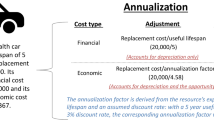Abstract
The continued growth in the economic evaluation of healthcare over the past 25 years has led to a shortage of trained health economists globally, leading to a number of universities and/or national governments developing specialised health economics programmes to train more health economists. One of the common problems with many of these training programmes is that they only educate new health economists to the Masters level, and as such they are unable to cover the many skills needed by a successful health economist. Furthermore, government and industry interests have ensured that economic evaluation is a heavily regulated environment that gives little incentive to seek further education. These two related factors (under-education and over-regulation) have lead to a situation where economic evaluation methods may adversely limit innovation of therapeutics and devices in clinical areas that perform badly when evaluated on the cost per QALY scale. The good news, however, is that the tide is turning and theoretically sound adjustments (such as risk adjustments and stated preferences) to the current paradigm are now being considered. This, of cause, is just the tip of the iceberg with other important issues such as time preference and the endogeneity of preference remaining very much under-researched areas in health.
This paper concludes that many of these real-world issues, such as patient preferences, can be avoided by using artificial objective functions such as cost per QALY, but this comes at the cost of irrelevance and the misallocation of resources. If we are to meet all of the future challenges in economic evaluation in healthcare then we must focus more on advanced education and far less on the regulation of health economists.
Similar content being viewed by others
References
Briggs A, Wonderling D, Mooney C. Pulling cost-effectiveness analysis up by its bootstraps: a non-parametric approach to confidence interval estimation. Health Econ 1997; 6: 327–40
Graff Zivin J. Cost-effectiveness analysis with risk aversion. Health Econ 2001; 10: 499–508
Claxton K. The irrelevance of inference: a decision-making approach to the stochastic evaluation of health care technologies. J Health Econ 1999; 18: 341–64
Meltzer D. Addressing uncertainty in medical cost-effectiveness analysis: implications of expected utility maximization for methods to perform sensitivity analysis and the use of costeffectiveness analysis to set priorities for medical research. J Health Econ 2001; 20: 109–29
Sendi P, Gafni A, Birch S. Opportunity costs and uncertainty in the economic evaluation of health care interventions. Health Econ 2002; 11 (1): 23–31
Birch S, Gafni A. Cost effectiveness/utility analysis: do current decision rules lead us to where we want to be? J Health Econ 1992; 11 (3): 279–96
Birch S, Gafni A. Cost effectiveness ratios: in a league of there own. Health Policy 1994; 28: 133–41
Bridges J. Stated preference methods in health care evaluation: an emerging methodological paradigm in health economics. Appl Health Econ Health Policy 2003; 2 (4): 213–24
Graff Zivin J, Bridges J. Addressing risk preferences in costeffectiveness analyses. Appl Health Econ Health Policy 2002; 1 (3): 135–9
Bridges J. Understanding the risks associated with resource allocation decisions in health: an illustration of the importance of portfolio theory. Health, Risk and Society 2004; 6 (3): 257–75
Donaldson C, Shackley P. Does `process utility’ exist? A case study of willingness to pay for laparoscopic cholesystectomy. Soc Sci Med 1997; 44 (5): 699–707
Ryan M, Gerard K. Using discrete choice experiments to value health care programmes: current practice and future research reflections. Appl Health Econ Health Policy 2003; 2 (1): 55–64
Maynard A, Sheldon T. (1997) Health economics: has it fulfilled its potential? In: Maynard A, Charmers I, editors. Nonrandom reflections on health services research. London: BMA Publications and Nuffield Provincial Trust, 1997: 149–65
Birch S, Donaldson C. Valuing the benefits and costs of health care programmes: where’s the extra in extra wefarism? Soc Sci Med 2003; 56: 1121–33
Roter D. Patient-centered communication. BMJ 2004 Jun 12; 328 (7453): E303–4
Bridges J, Terris D. Portfolio evaluation of health programs: a reply to Sendi, et al. Soc Sci Med 2004; 58: 1849–51
Ryan M. Using conjoint analysis to take account of patient preferences and go beyond health outcomes: an application to in vitro fertilization. Soc Sci Med 1999; 48: 535–46
Bowles S. Endogenous preferences: the culture consequences of markets and other economic institutions. J Econ Lit 1998; 36 (1): 75–111
Acknowledgements
Funding for Dr Bridges was made available through grant # HS-01-3738 entitled ‘Current and Inter-temporal Uncertainty in Cost Effectiveness Analysis’ from the Agency for Healthcare Research and Quality, National Institutes of Health. The author is also grateful for the thought provoking comments provided by Trevor Sheldon and Darcey Terris on an earlier draft of this editorial.
The author has no conflicts of interest that are directly relevant to the content of this manuscript.
Author information
Authors and Affiliations
Corresponding author
Rights and permissions
About this article
Cite this article
Bridges, J.F.P. Future challenges for the economic evaluation of healthcare. Pharmacoeconomics 23, 317–321 (2005). https://doi.org/10.2165/00019053-200523040-00002
Published:
Issue Date:
DOI: https://doi.org/10.2165/00019053-200523040-00002




